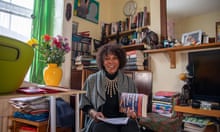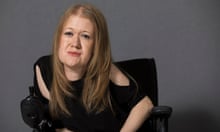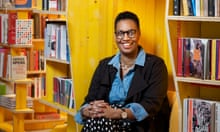Bernardine Evaristo, the first black woman to win the Booker prize, has hit out at “ridiculous” and “misguided” beliefs in the publishing industry, where “black and Asian people are not considered to be a substantial readership, or to even be readers”.
Evaristo, writing the foreword for the UK’s first academic study into diversity in trade fiction and publishing, released on Tuesday, said the report showed that the UK books industry “hasn’t changed fast enough to become more inclusive”. A key finding of the study was that writers of colour and their books are “either whitewashed or exoticised” to appeal to what UK publishing sees as its core audience of white, middle-class readers.
The report, Rethinking “Diversity” in Publishing, found that writers of colour are disadvantaged during each key stage of the publishing process, from finding an agent, to having to “fulfil certain expectations of what white, middle-class editors want” with their writing in order to land a book deal.
The study is based on more than 100 interviews with authors, agents and publishing staff across editorial, design, publicity, marketing and sales, about their practices and their experience publishing writers of colour. Researchers found the majority of publishing continues to cater for what it sees as a “core audience” of white, middle-class readers – “a sort of 50-something middle-class to upper-middle-class white woman who reads a lot because she has time, and she has resources to spend on books,” according to one respondent.
The report is published the week after the launch of the Black Writers’ Guild, which is calling for sweeping reforms to a publishing industry where only 11.6% of respondents identified as BAME. It also follows the #publishingpaidme hashtag, which saw writers revealing what they had been paid to highlight the disparity between advances for black and white authors.
Evaristo, who won the Booker last year for Girl, Woman, Other, writes in the new report of her own experiences when her 2013 novel Mr Loverman “was negatively considered by some in the industry as triple niche” because its protagonist is an older, gay, black man.
“What were they saying? That whiteness reigns supreme, heteronormativity is acceptable and old people be gone from the pages of our books because you are of little importance?” asked Evaristo. “The truth is that good literature about anything can be enjoyed by all kinds of people. Literature transcends all perceived differences and barriers. It’s partly the point of it.”
It is frustrating, Evaristo writes, to learn that “the publishing industry is still run by the predominantly white, middle-class demographic of years ago, and that the perceived target reader is a middle-aged, middle-class white woman, who apparently does not have the imagination to want to engage with writings by people of colour, which is plainly untrue”.
Publishers, particularly the large ones, assume that audiences are white and middle class, and undervalue black, Asian and minority ethnic and working-class audiences, the report found. “Writers of colour are essentially promoted to appeal to this core audience, which can lead to their exoticisation and marginalisation,” write the report’s authors, Dr Anamik Saha and Dr Sandra van Lente.
Talking to publishers about book cover design, the researchers found that “there remains a fear that featuring a racial or ethnic minority person on the cover could lead to diminished sales” – one respondent said they had heard their then managing director, who is still in a senior role in publishing, say: “We can’t put a black girl on the cover of a book because it won’t sell.” Some of those interviewed spoke of characters from ethnic backgrounds “literally being whitened on covers”.
“Publishers either downplay or reject strong racial signifiers [on book covers] through fear of making the book too niche, or represent their difference in a softly, exoticised way (such as the use of ethnic fabrics) that would appeal to a liberal, white, middle-class sensibility,” found the report.
Publishers also see writers of colour as a “commercial risk”, according to the study. One BAME respondent said they had watched editors “asking for changes to a manuscript by a writer of colour that basically amounted to it being ‘translated for a white reader’”.
The report, which is a partnership between Goldsmiths, University of London along with Spread the Word and the Bookseller, is calling on the book industry, from publishers and agents to booksellers, to challenge their practices, behaviour and cultural biases, to work with writing agencies to identify talented writers of colour, to hire more diversely, and to value non-white, non-middle-class audiences. It is being launched as part of a virtual #RethinkingDiversity week from Monday.
“Our study finds that publishers and booksellers do not have the resources, know-how, or, sadly, the inclination to reach wider audiences. They do not see the economic or cultural benefit. Big publishers and booksellers need to radically reimagine their audience,” said Saha. “The entire industry is essentially set up to cater for white, middle-class readers, in terms of the books it produces, the media it engages, even the look and feel of bookstores and the demographics they serve. This has to change.”








